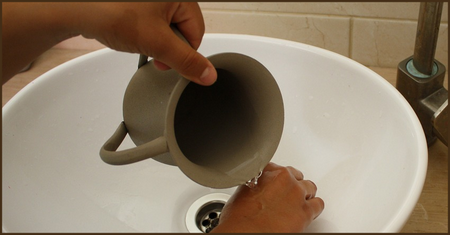Under Mosaic law, there were certain actions and circumstances that rendered a person defiled before God. The Hebrew word translated defiled in the Old Testament texts discussing this state (tâmê) is defined by Strong: to be foul, especially in a ceremonial or moral sense (contaminated).
The reference to ceremonial “foulness” is especially important in light of the Old Testament references to such defilements. While they sometimes refer to moral actions that intrinsically are sinful (such as idolatry, sexual immorality, etc.), often it had reference to things that are not inherently sinful in God’s eyes. Things like childbirth, the touching of a dead body, or a woman’s menstruation.
There were very specific reasons why the such ceremonial defilements were discussed in such detail under the Mosaic laws. Some centered on physical health and hygiene. Dietary restrictions and quarantines brought protection to the people. But, above all things, it taught the people to respect the holiness of God. Any approach to the Almighty had to be taken seriously. If any uncleanness (either ceremonial or moral) as found in any person, an offering had to be made to the Lord as an atonement. “It is a trespass offering; he has certainly trespassed against the Lord” (Leviticus 5:19).
When Nadab and Abihu offered up fire that had not been consecrated by God, He punished them with death. The fire was described as “profane” (strange, as opposed to that which is upright or truthful). In his explanation to Aaron, Moses repeated these words from Jehovah, “By those who come near Me I must be regarded as holy; and before all the people I must be glorified” (Leviticus 10:3). As it was unauthorized by God, it was a defilement of the worship that God had established. It showed a disrespect for God that made the men worthy of death. Aaron recognized this, and “So Aaron held his peace” (Leviticus 10:3).
There are many scriptures in the Old Testament that marry the responsibility of the people to be holy, with God’s own holiness. Consider these few:
“For I am the Lord who brings you up out of the land of Egypt, to be your God. You shall therefore be holy, for I am holy” (Leviticus 11:45).
“Consecrate yourselves therefore, and be holy, for I am the Lord your God. And you shall keep My statutes, and perform them: I am the Lord who sanctifies you” (Leviticus 20:7-8).
“Say to them: ‘Whoever of all your descendants throughout your generations, who goes near the holy things which the children of Israel dedicate to the Lord, while he has uncleanness upon him, that person shall be cut off from My presence: I am the Lord’” (Leviticus 22:3).
The Jews took the matter seriously. So seriously, in fact, that they erected man-made traditions that went even beyond what God required. One area where this was so (and is practiced today) is the ceremonial washing of hands before eating. There is a reference to this in the conversation Jesus had with the scribes and Pharisees in Mark 7.
“Now when they saw some of His disciples eat bread with defiled, that is, with unwashed hands, they found fault. 3 For the Pharisees and all the Jews do not eat unless they wash their hands in a special way, holding the tradition of the elders. 4 When they come from the marketplace, they do not eat unless they wash. And there are many other things which they have received and hold, like the washing of cups, pitchers, copper vessels, and couches” (Mark 7:2-4).
In defending His disciples, Jesus pointed out that as the Pharisees were upholding the traditions of the elders, they were defiling themselves by rejecting “the commandment of God” (7:9). For example, they were failing to honor their fathers and mothers, and justifying it by their own traditions.
Jesus also expressed the concept of defilement under His own covenant. “There is nothing that enters a man from outside which can defile him; but the things which come out of him, those are the things that defile a man” (Mark 7:15). Now, it matters not what you eat (cf. Acts 10:10-16), rather it is the sins of a man that defile him! “And He said, ‘What comes out of a man, that defiles a man. For from within, out of the heart of men, proceed evil thoughts, adulteries, fornications, murders, thefts, covetousness, wickedness, deceit, lewdness, an evil eye, blasphemy, pride, foolishness. All these evil things come from within and defile a man’” (Mark 7:20-23).
True defilement is the antithesis of holiness. Peter spoke of this truth in exhorting his readers to holy living, “as obedient children, not conforming yourselves to the former lusts, as in your ignorance; but as He who called you is holy, you also be holy in all your conduct, because it is written, ‘Be holy, for I am holy’” (1 Peter 1:14-16).
As the defilement of sin is spiritual, true cleansing comes from a spiritual cleansing. Not the ceremonial washing of hands, but the shedding of Jesus’ blood on the cross. “But if we walk in the light as He is in the light, we have fellowship with one another, and the blood of Jesus Christ His Son cleanses us from all sin” (1 John 1:7).
Have you defiled yourself? Then come to Jesus for cleansing! In doing so, you will save your soul!





